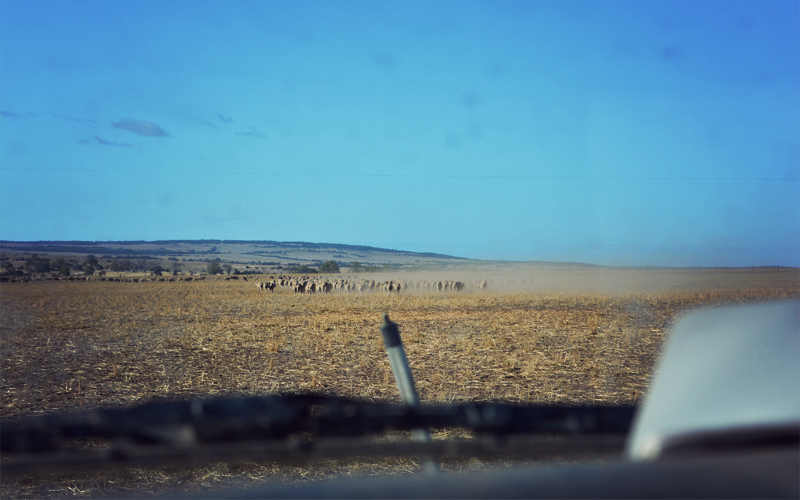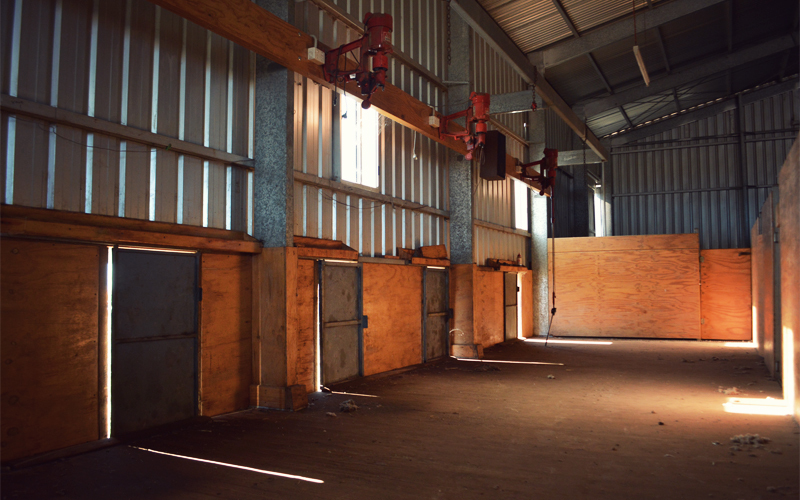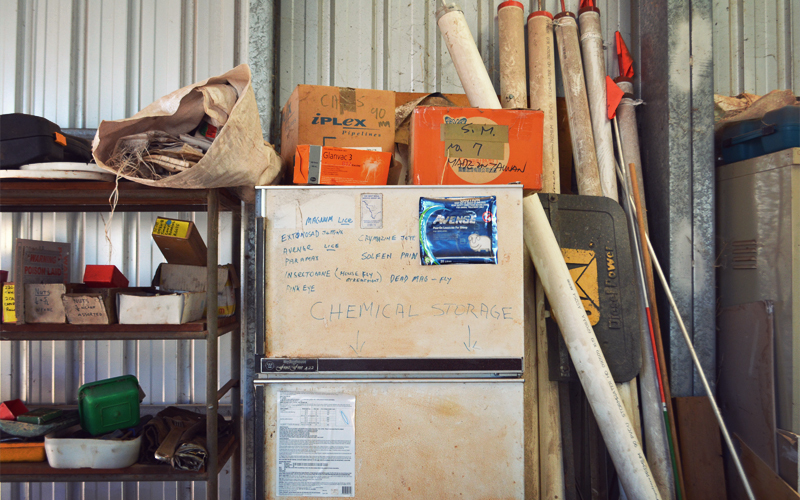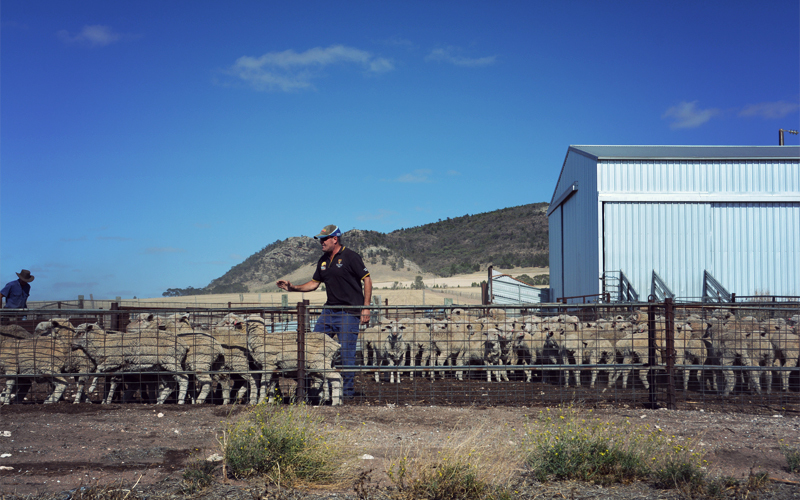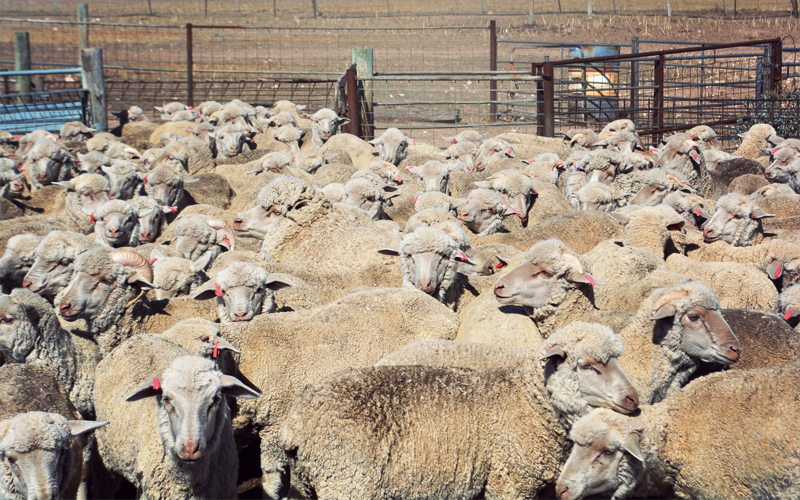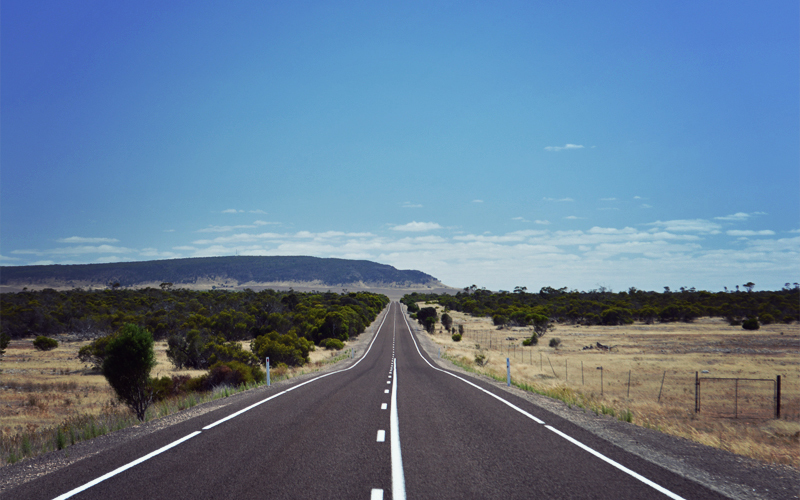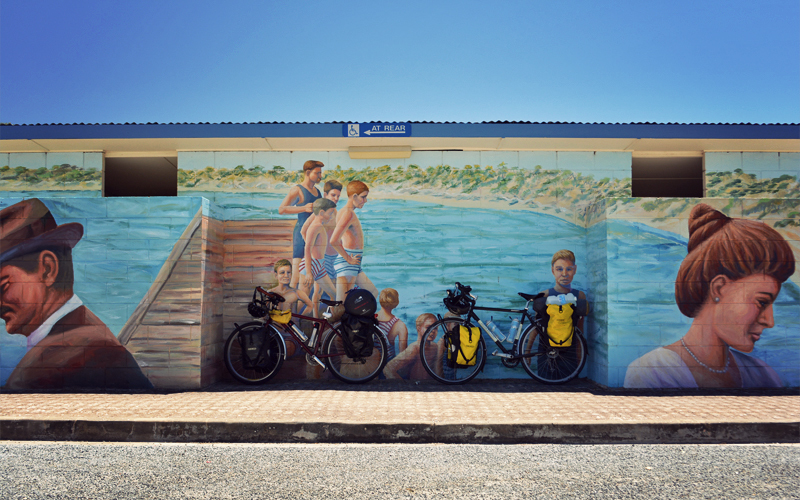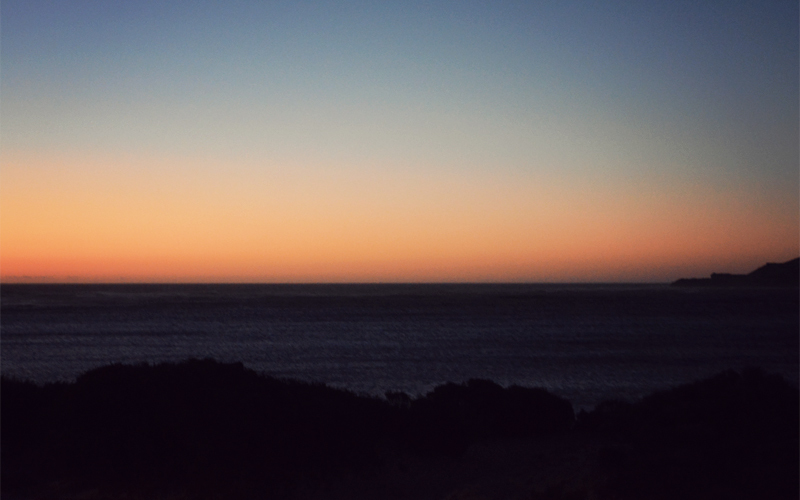January 27, 2015
Day 154: 38 miles west of Lock, SA to Elliston, SA
Last night Ian mentioned that he was going to help round up several hundred sheep the following morning. They call this mustering. It happens when it's time to shear the wool off the sheep, but it also takes place several other times throughout the year for a bunch of different reasons. In this case the animals need to be mustered so that they can be given a dose of minerals. And the sheep need that because the wheat grass on which they graze doesn't have enough naturally occurring minerals on its own. As soon as I heard this I asked Ian if we could stick around awhile in the morning and come along. He seemed surprised that we'd want to, but in the next breath said that of course we could.
And so just after 8:00, with the sun already well up into the sky and a cool wind blowing strong up from the south, we stand in front of the farm house. In the driveway sits a dirty white ute, idling, smelling of diesel exhaust, with a black- and tan-colored Australian Kelpie dog barking out of excitement in the back. He knows what's coming.
Within minutes we cross the road, open the gate to the adjacent field, and then we're off. The truck bounds through the wheat field where the stalks grow only an inch or two high, and where the constant deep depressions in the dirt send our bodies jerking left and right and up and down and make the suspension clank and clatter without end. Throughout all of it the dog in the ute bed behind us barks and barks and barks.
At first the ute moves at a slow and even pace. Ian makes a broad half circle in one direction before turning 180 degrees and making a broad half circle in the opposite direction. This is enough to get the majority of the sheep headed the right way, both because they've been through this process before and also because one of the traits that's been bred into them over decades and centuries through countless generations is the willingness to do whatever the animals around them are doing. With the mustering now set in motion, the three of us sit on the dirt-stained vinyl bench seat of the idling ute — Ian at the wheel on the right, Kristen in the middle, me on the left — and give the sheep time to walk the quarter mile toward the corner of the massive paddock, which almost all of them do.

| Heart | 1 | Comment | 0 | Link |
But of course there are a few stragglers, and the stragglers are what make everything interesting.
"They're dumb animals," Ian tells us. "Ya gotta get them tuned. Ya gotta get them used to the dogs pushing them in the right direction."
And with that the Kelpie that hasn't stopped barking has its leash unhooked. It leaps off the ute bed and flies at top speed toward the misdirected handful of sheep. The dog mostly knows what to do already, but when he gets off track or starts to nip at the animals instead of guiding them the correct way by his presence alone, Ian lets out an ear-piercing whistle through the gaps in his teeth and yells out, "Hey!"
The dog doesn't work alone today. As he loops around on the near side, the three of us get back to pinballing back and forth in our seats as the ute lurches out of neutral and charges across the paddock. There aren't any lazy half circles this time; we fly at higher speeds through tighter turns, with a lot of starting and stopping, reversing, and then starting again as we chase down sheep who move with the jerky and desperate quickness of, well, a cornered animal. But Ian's skill with the ute is solid, his control of the dog refined, and there's nothing in the world the dog loves more than herding. This means that one by one the stragglers lose the idea that they're going to be able to head off on their own, and soon they've all come together in a loose but focused mass that trots toward the far corner of the paddock near the shearing barn, leaving behind one big cloud of dust kicked up by hundreds of sets of hooves.
The first part of the job is done.
But although the sheep are now in the same corner, there's still the matter of getting them into the corrals that lie behind the barn, where they'll be held down for a few seconds and given the minerals. At this point Ian's son appears, along with another farmhand and two more Kelpies. We all climb out of the ute, and Kristen and I stand next to it at a distance as we watch the farmers and the dogs do what farmers and dogs have been doing out here for more than a hundred years. Ian and his son both work the dogs, at different points yelling out commands to them and pointing in the direction they want them to go. The dogs are the absolute highlight of the morning. We're captivated as we watch them stalk and nip at the sheep, get low to the ground and impose their will by barking or just with a look, run at full speed to chase down the wanderers and nudge them back in the opposite direction, and somehow manage to leap over the top of metal fence gates that stand four feet off the ground. More so than any dogs either of us have ever seen, these Kelpies are alive. Unlike all of the city and suburban dogs who sit around a house or a yard for most of their lives, these guys are doing exactly what they've been trained for. They have a purpose in life, an important job that no one else on the farm can do. All they want is to work hard, to receive a little praise, and to get a bowl of food at the start and the end of the day. They're alive and they're happy; they're so happy, so fulfilled.
Man and dog work together to move the sheep into smaller and smaller paddocks, then into a small pen, until at last they've been corralled into narrow passageways. The entire process, the whole tightly choreographed dance that started when we walked out the front door of the farm house, takes no more than fifteen minutes.
With the mustered sheep being given a liquid mixture of minerals by way of a tube that squirts it down their throats, we start riding again in the late morning. On a highway empty of traffic we head past the remnants of fences made not from wood and barbed wire but from stone. It's the kind of country where white-tailed rabbits shoot across the road or off into the fields the instant they notice us, and where ground water is so consistently scarce that some of the trees rely not on roots but only what falls from the sky onto their leaves.
Along the way I hear an occasional clicking noise coming from somewhere on my bike. At first I think it's a bolt on the front fender that's been coming loose every couple of days, or that the side of the fender is bouncing off the edge of the tire as it does when it's been bumped out of alignment. But within a few minutes I realize it can only be one thing: a broken spoke on the cheap thirty-two-hole rear rim I've been using since the freehub broke on my original wheel 1,600 miles ago.
Shit.
I know that at one time there was a bike shop 150 miles up the road in Ceduna, but I'm not sure if it's still there. There might be one in Port Lincoln about a hundred miles to the south, but it's far enough away and there's enough headwind that I'd have to get a ride there and back. It isn't that I can't try to install the Fiberfix emergency spoke that I've carried for six years but never used; it's more about what happens if I break a second or third spoke after that because the tension of the wheel still isn't right. Although I have a pair of extra spokes, I don't have the tool I need to remove the cassette, nor a proper spoke wrench, nor have I ever installed a spoke or tried to true a bicycle wheel.
I think about all of this as we ride into the teeth of a massive headwind that lets us move forward only at five or six miles per hour, no matter how much effort we put out. It clouds out all other thoughts, to the point that I hardly notice when a pair of emus run alongside our right side in the distance for about twenty seconds before they hang a hard left and cross the highway a few hundred feet in front of us, with their masses of tailfeathers shaking like a couple of giant furry asses.
By the time we roll into Elliston, a second spoke has broken. In the quarter of a mile it takes us to ride from the public restroom to the grocery store a third one snaps. A quick web search shows that Ceduna has no proper bike shop anymore, and a call to the shop in Port Lincoln tells us that they only have a few cheap thirty-two-spoke wheels like the one I have, the one that's on the road to dying.
As we stand in front of the grocery store, I think about how if you had to make odds on how this new problem will end up, the We're fucked option stands at even money right now. There aren't any good replacement wheels anywhere on the Eyre Peninsula; they just don't exist. There might be one in Adelaide, but it's a ten-hour bus ride each way to get there, and that's after hitch hiking to Ceduna or Port Lincoln and then back again because no buses run on the west side of the peninsula. Shipping it here would take just as long and probably cost a hell of a lot, and that again assumes that I could get a solid touring wheel in the first place. In either case, getting a wheel to Elliston would delay us enough that we'd have to crank even harder to make it to Perth by the first of March, which is now only thirty-two days away. It has taken us forty-two days to go less than half of that distance so far.
The only other practical option is to hitch hike into Port Lincoln with the wheel, get the spokes replaced, and hope that the guy doing the work knows how to properly tension a wheel. On a touring bike where so much of the weight heads to the ground through the rear wheel, if the tension on the spokes isn't just right it's only a matter if time before it'll start shedding spokes again — and that time is almost certain to come long before we reach Perth. We could find ourselves with just as serious mechanical problems but in an even more remote place if that happens.
But if ever there was a place in rural Australia that was a good spot for us to break down, Elliston is it. Last night Dianne mentioned that if we decided to stay in town that they had not one but two different houses that we were welcome to stay at. With the wheel problems having made the decision for us, Kristen gives her a call and tells her that we need help. Within twenty minutes we find ourselves standing inside of a little-used two-story beach house overlooking the sparkling blue-green surface of Waterloo Bay and the breaking waves of the Southern Ocean beyond.
It's late in the day by the time we get settled in, but I still have just enough time to research custom wheel builders in Adelaide and then place a call to the guy that comes most highly recommended. He confirms what I already guessed would be true, that he doesn't know of any shop in the entire city or outlying areas that has even one thirty-six-hole rim. But he also says that it shouldn't be a problem to put together a hand-built, hand-tensioned, hand-trued thirty-two-spoke wheel and have it shipped by courier to the bike shop in Port Lincoln either tomorrow or at worst the day after. For some reason he can't take credit card payments over the phone, and there are also the matters of getting a replacement cassette installed on the new wheel in Port Lincoln and then having the wheel shipped a hundred miles north to Elliston, but those are all problems that come with workable solutions. It might be a few days, and it's going to cost several hundred dollars to get all of it sorted out, but against everything I expected it seems like we'll soon be back on the road. Right now that's all that matters.
Dianne offers us to join her for dinner and we accept. Over a table of crumbed whiting caught in the waters that crash and roll off to our right, she casually tells the story of the tornado that roared through town many years back. Fortunately she and Ian and their family were back at home on the farm, because the tornado passed directly over the beach house, tearing the upper story away from the bottom floor and sending it airborne before dropping it off on the tall line of sand dunes that sit more than fifty feet away to the east. We also talk a lot about the economics of farming, how the prices for wheat and wool haven't increased all that much over the years, but the costs for fuel and machinery and labor and shipping have. It's these shrinking margins that force a lot of long-time farmers out of the business, and lead the farmers that are left to buy and manage more and more land.
But with greater size comes greater risk. If it's an especially cold or hot year, or if a lot of sheep get sick and die for any of a dozen different reasons, some or all of the hundreds of thousands of dollars that have been poured into the land and the animals are gone forever. Loans from the bank can help bridge the gap, but it takes modest-sized farms four or five years to pay them back. If multiple bad years stack up one after the next, selling off the farm to someone with an even bigger operation is often the only option left. It's the kind of high-risk-moderate-reward industry that most business owners would never be willing to accept. But when farming is all you've ever known, all your ancestors ever knew, and all that you hope your children will ever know, the choice that's the most rational and most sensible isn't always the one you make.
For the second day in a row we go to bed exhausted, but also full of food, feeling welcomed and taken care of, and once again amazed at the implausible series of events and circumstances that have led us to find ourselves exactly here.
Today's ride: 23 miles (37 km)
Total: 5,117 miles (8,235 km)
| Rate this entry's writing | Heart | 2 |
| Comment on this entry | Comment | 0 |
